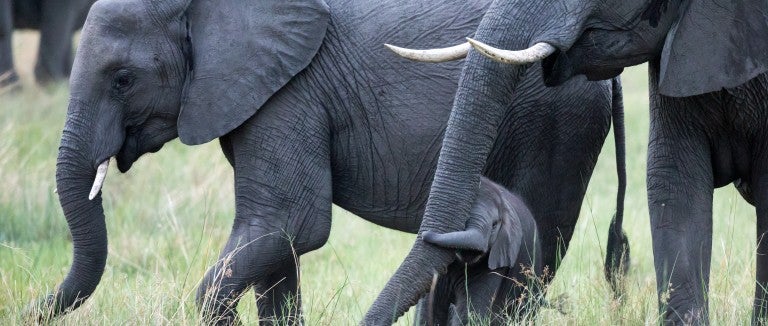Today, Canada took a historic step forward in defense of imperiled wild animals, announcing landmark regulations that ban trade in elephant ivory and rhino horn, as well as imports of hunting trophies containing these parts.
This is one success my colleagues and I can really savor and celebrate. For seven years, Humane Society International/Canada has led a national campaign to stop the Canadian trade in elephant ivory and rhino horn, working within multiple administrations to achieve this goal. Our Canadian colleagues liaised with global conservationists, foundations and international governments; galvanized over 100,000 supporters to engage in public consultations and attracted the public support for the measure of many notable Canadians including world renowned musician Bryan Adams; and provided technical briefs, legal opinions and draft legislation.
Earlier today, our Canadian colleagues held a joint press conference with Steven Guilbeault, Canadian Minister of Environment and Climate Change to herald the new measures, which are among the strongest of their kind in the world. Canada’s decision has overwhelming support from leading conservationists, animal protection groups and African nations, as well as the public: A public petition calling for a Canadian ban on elephant ivory trade collected more than 700,000 signatures.
In recent decades, African elephants and rhinos have become iconic symbols for the full suite of charismatic wildlife species that millions of caring people worldwide celebrate, cherish and defend. And we have reached a moment in history when we must intensify our efforts to defend them in the face of a rapacious and devastating international trade in their parts. Canada’s move is not just timely; it’s a powerful declaration of hope, determination and investment in the idea that these animals are worth fighting for, now and forever. And we’re going to press other nations to follow her example.
Over the past century, the African elephant population has plummeted by 96%, and three species of rhinos have become classified as Critically Endangered. The global wildlife trade, habitat loss and human-wildlife conflict have pushed elephant and rhino populations to the breaking point. Scientists warn that African elephants and many species of rhinoceros could become extinct within the next few decades in the absence of global intervention to disincentivize poachers. And that means shutting down the global marketplace that makes the selling of ivory or horn at all profitable.
When thinking about the plight of these and other imperiled species, it’s important that we balance statistics and abstractions with the tangible: Canada’s action aims to make a difference for individual animals who may become safer from the threat of poachers as a result. Elephant families share complex bonds. An elephant meeting a violent end causes immense pain and disruption, reverberating through the animal's entire herd. Elephant family members have been documented mourning their dead. As many as 25,000 elephants die every year at the hands of poachers in Africa, and their deaths cause immeasurable suffering to thousands more who survive them.
Canada’s move underscores the responsibility of all nations to do everything in their power to protect African elephants and rhinos. The new regulations, which come into effect on Jan. 8, 2024, send a clear message to the world community that elephant ivory belongs to elephants, and rhino horn to rhinos. Their right to live in peace and safety shouldn’t be traded away for a few trinkets in a jewelry box, a hokum aphrodisiac or life-extender, or a tasteless trophy display in somebody’s den.
Follow Kitty Block @HSUSKittyBlock.



